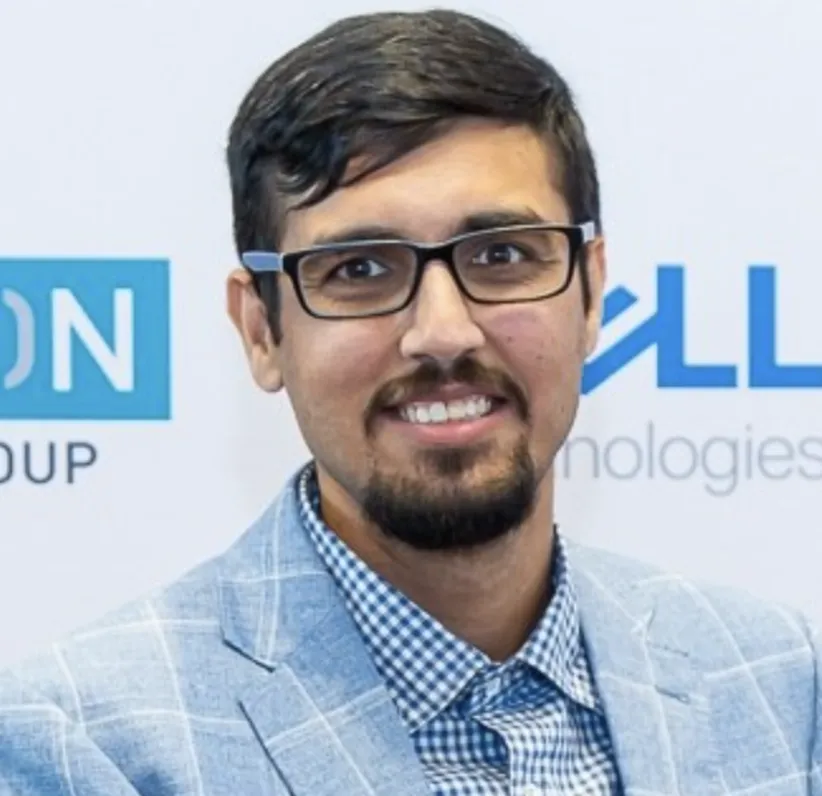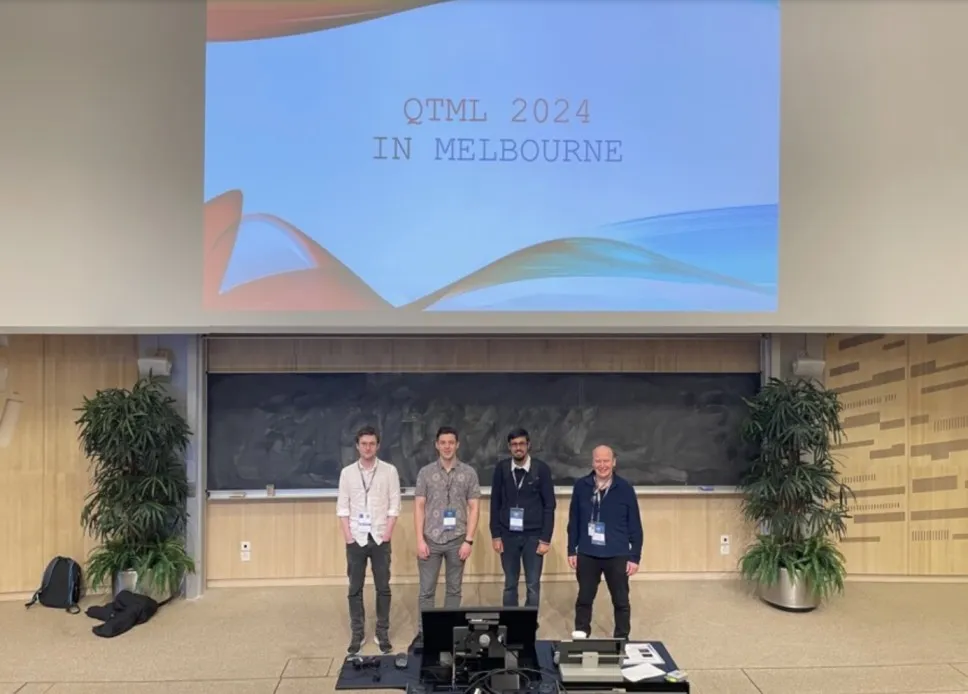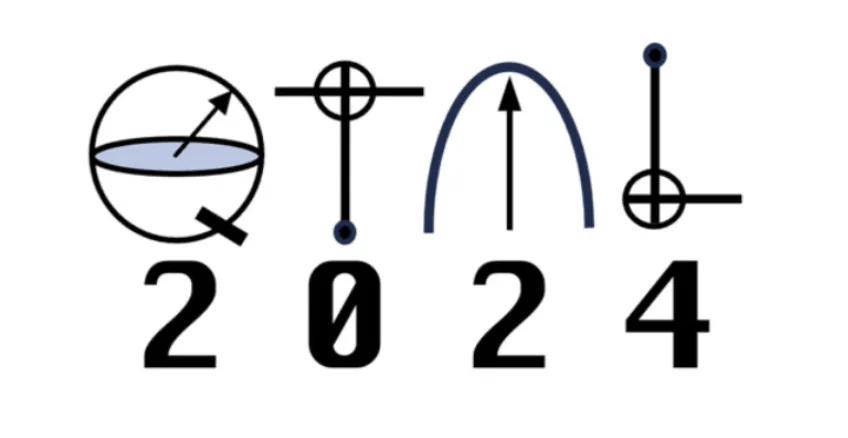QTML 2024: Quantum Computing and Machine Learning Insights with Chair Dr. Muhammad Usman

Image credit: QTML 2024
The 8th International Conference on Quantum Techniques in Machine Learning (QTML 2024) is set to take place from Sunday to Friday, 24 to 29 November 2024, at the University of Melbourne, marking the first time this prestigious event will be hosted in Australia. The event will bring together leading experts in quantum computing and machine learning.

Above: Dr. Muhammad Usman, Head of the Quantum Systems Team at CSIRO and Associate Professor at The University of Melbourne.
To shed light on the significance of QTML and the future of quantum computing, we spoke with Dr. Muhammad Usman, Head of the Quantum Systems Team at the CSIRO and Associate Professor at the University of Melbourne. As chair of the QTML 2024 organising committee, Dr. Usman shares insights on the event and the exciting advancements in quantum machine learning.
Could you share a bit about your background and your role in the QTML 2024 event?
I lead the Quantum Systems Team at CSIRO and have associate professor affiliations at the University of Melbourne and Monash University. My research focuses on developing quantum algorithms and software to help accelerate the adoption of quantum technologies for industrial and commercial applications.
As the chair of the QTML 2024 organising committee, I work closely with a fantastic team of researchers from the University of Melbourne and CSIRO to host the event. We’ve also assembled a diverse international program committee to curate an excellent scientific program.
QTML is one of the world’s leading conferences on quantum machine learning, and we’re thrilled to bring it to Australia for the first time. This event will be a platform for national and international delegates to engage in meaningful discussions, form collaborations, and drive the future of quantum computing and machine learning.
What makes QTML 2024 particularly important in today’s technological landscape?
Quantum computing technologies are an emerging paradigm of computing which has the potential to offer revolutionary benefits for many areas of research, enabling new scientific discoveries and breakthroughs. In 2022, CSIRO estimated that quantum technologies will lead to a direct economic benefit of over $19.4 billion for Australia, creating over 16,000 new jobs. In May 2023, the Australian Government published the National Quantum Strategy, which aims to support Australian quantum industry and research.
One of the most exciting applications of quantum computing is its integration with machine learning. This combination could significantly improve training speed, accuracy, and robustness of machine learning models. Therefore, quantum machine learning is one of the most rapidly growing fields of research in the world.
QTML 2024 will provide a great platform for academic researchers and industry developers to present state of the art research on quantum machine learning, which will create an excellent environment for the exchange of knowledge and generation of new ideas.

Above: Members of the QTML 2024 Organising Committee (From left to right is Maxwell West, Jamie Heredge, Dr. Muhammad Usman, and Martin Sevior) at the QTML 2023 CERN announcing the next conference to be held in Melbourne Australia.
What initiatives will QTML 2024 offer to students and early-career researchers?
We’re excited to provide four tutorials at the beginning of the conference that are specifically designed for students and early-career researchers. These tutorials will offer foundational knowledge and hands-on experience in quantum computing and machine learning, helping participants gain valuable skills.
A unique highlight this year is a special quantum computing tutorial for high school students. This is the first time we’re offering this since the QTML series began. By introducing high school students to quantum technologies, we hope to spark interest and inspire the next generation of innovators.
How do you see quantum techniques revolutionising AI and machine learning? What breakthroughs should we be looking out for?
Quantum computing has been predicted to offer faster training of machine learning models, better accuracy in extracting or learning features from large and complex datasets, and superior robustness against cyber-attacks in artificial intelligence based autonomous systems.
While the potential of quantum machine learning is promising, applying it to real-world problems remains a challenge. More research is needed to solve key issues, such as the difficulty in efficiently processing data on quantum systems, the complexity of quantum circuits, and the high error rates in today’s quantum processors.
All these issues are the subject of intense ongoing research, and several important advancements have been recently published. In the coming years, we expect to see groundbreaking research that addresses current challenges in training quantum machine learning models and improves how data is processed, making quantum systems more efficient. Along with improvements in quantum processors, such as larger and more reliable qubits, these advancements should help bring practical applications of quantum machine learning closer to reality.
Could you share some insights into your current research in quantum computing and machine learning?
The intersection of quantum computing and machine learning is a highly topical area of research which is rapidly growing and progressing. On one side, Classical Machine Learning could significantly improve the performance of quantum processors through precision qubit characterisation, noise mitigation or error correction and the design of optimised control. On the other side, Quantum Computing could lead to the design of new Quantum Machine Learning models which aim to explicitly exploit quantum mechanical properties such as superposition and entanglement to outperform their classical counterparts.
Our group’s research focuses on both fronts. For example, we have recently published in Quantum journal world’s largest demonstration of machine learning based quantum error correction over 4 million qubits, exhibiting the potential for classical machine learning in improving the performance of quantum computers. In our other work published in Nature Machine Intelligence journal, we have shown that quantum machine learning models could offer extreme robustness against adversarial or spoofing attacks, significantly outperforming classical machine learning models, outlining a possible advantage of quantum computing for machine learning.
QTML Conference covers both areas of research (Machine Learning for Quantum Computing and Quantum Computing for Machine Learning) and aims to provide a comprehensive platform for understanding the potential at the intersection of two exciting fields.
You’ve also been involved in developing a quantum computer compiler. Can you explain its significance and how it might enhance quantum machine learning?
Our group is building a versatile quantum software platform, underpinned by a powerful quantum compiler. The vision behind this project is to lower the barrier for quantum programmers and application developers.
We are developing a new quantum programming language which will offer users an easy-to-program interface. The quantum compiler will not only translate high-level quantum programs to low-level instructions for quantum processors in a hardware agnostic approach but will also include build-in functionality for complex concepts such as quantum error correction and quantum control.
The quantum software platform will make quantum computing accessible to researchers without quantum physics background, allowing computer scientists and engineers to readily program quantum processors. This will accelerate the development of new quantum algorithms which includes quantum machine learning models and architectures.
Finally, what excites you most about the future of quantum technology and its potential to reshape AI and beyond?
Machine Learning and Artificial Intelligence are rapidly becoming pervasive, and the integration of AI in security sensitive applications is no exception. We are increasingly observing the emergence of self-driving vehicles, autonomous medical diagnostic systems, and AI-operated drones carrying lethal weapons in battlefields. In such critical applications, if AI is not trust-worthy, the consequences of any wrong decision by an autonomous AI system could be extremely serious. Imagine a self-driving car missing pedestrians on the road; or a drone with a lethal weapon mistaking friendly troops as enemy troops. Such dreadful scenarios resulting from wrong AI decisions are unlimited.
While the conventional classical AI systems are vulnerable to cyber-attacks and are deemed not reliable, research from our group at CSIRO and the University of Melbourne has demonstrated that the integration of quantum computing in AI makes it extremely robust and trustworthy. In my opinion, this is one of the most exciting use cases for quantum computing which could entirely revolutionise AI, leading the world into a new era of trustworthy autonomous systems empowered by quantum technologies.

QTML 2024 is your gateway to understanding the revolutionary impact of quantum computing and machine learning. With experts from around the globe gathering to share their insights, this conference offers a wealth of knowledge and a glimpse into the future of technology.
 Digital Innovation Futures Hub
Digital Innovation Futures Hub



